A TRIBUTE TO
PLAYBACK SINGER
"MUBARAK BEGUM"
Dear Purinder,
The Way you connected with a Favourite Singer of yours one morning in 2008, was no Fluke as the odds are 1 in 1.3 billion people in India. Definitely PreOrdained. It was part of your Karma to help this Lady out at that point of her life.
All our Souls are interconnected and Part & Parcel of the same "Entity" if you believe in this concept. We have to ask ourselves why we meet different people at different stages of our lives ?
"Truly Priceless Experience" I must say.
Thank You for Sharing this at Our Zoom Meeting last night.
Ram
Sydney
28th June 2020
2013 REUNION AT KUMARAKOM
xxxxxxxxxxxxxxxxxxxxx
The Following was Narrated by Purinder Ganju
at IITM Batchmates Weekly Zoom meeting
on
27th June 2020
xxxxxxxxxxxxxxxxxxxxx
The Following was Narrated by Purinder Ganju
at IITM Batchmates Weekly Zoom meeting
on
27th June 2020
"On the morning of the show I was informed by the organisers that Mubarak Begum wished to see me that day at noon. Although not sure as to why I was being ‘summoned’, I landed up in her hotel room which she was sharing with her grand-daughter, who had accompanied Mubarak Begum to Delhi.
After the formal pleasantries were over, Mubarak Begum gave me a hard look and asked me who I was and why was I doing this favour for her. And before I could answer she launched into a monologue telling me about her wretched life and about how she had been cheated by all those close to her. She wept copious tears and then proclaimed that I was “Allah ka Farishta” which translates into ‘an angel sent by Allah”. A few minutes later, I left her room very saddened and shaken.
Later that evening at her show, as a member of the audience, I saw her on stage, but she was not the person I had met a few hours earlier.
There she was , a seasoned artiste, who had the audience captivated - completely unrecognisable from the woman who had shared a tearful catharsis with me, barely a few hours ago.
Towards the end of the show, the organisers called me out from the audience and asked me join the performers on the stage. Once on stage, I was ‘introduced’ to Mubarak Begum. I have never forgotten that particular moment. She told the compere that she knew me ‘very well’ and then gave me a smile and a look that conveyed to me that the emotion-charged interaction earlier that day was only between her and me.
The show was called 'Hamari Yaad Aayegi' and was held in New Delhi on 13th April 2008.
(Click on Caption to go to Ibaadat Website)
One fine morning in February, 2008, Naveen Anand came to meet Prithvi Haldea and described to him, with pathos, the miserable state of life of the yesteryear great singer Mubarak Begum, about which he had come to know from another common friend - Purinder Ganju.
Prithvi, like Naveen, was instantly moved. Both deliberated on what could be done for this melodious persona, who sang few but amazing songs in the 60s and 70s. Raising some money and donating it to Begumsaheba was quickly ruled out as this was seen as giving alms. A wonderful idea then struck…can we get Mubarak Begum to come live on the stage, perform and make a rightful earning!
While Prithvi got down to fund raising (to meet the production cost and also generate enough money to pay gratitude to Mubarak Begum) , and instantly found his two friends Sanjiv Saraf and Vishnu Dusad becoming the main donors, Naveen worked hard on Begumsaheba persuading her to practice to sing to an audience.
While Prithvi got down to fund raising (to meet the production cost and also generate enough money to pay gratitude to Mubarak Begum) , and instantly found his two friends Sanjiv Saraf and Vishnu Dusad becoming the main donors, Naveen worked hard on Begumsaheba persuading her to practice to sing to an audience.
Begumsaheba had not sung publicly for 40 years, and this was indeed a Herculean task. Naveen also took charge of the production of the show, identifying other singers and musicians.
After over two months of preparation and hard work, the show finally materialized. Hamari yaad aayegi was staged to a packed hall at the India Islamic Cultural Centre on 13th April, 2008.
After over two months of preparation and hard work, the show finally materialized. Hamari yaad aayegi was staged to a packed hall at the India Islamic Cultural Centre on 13th April, 2008.
Begumsaheba rendered 5 of her favourite songs while a group of amateur singers, who had rehearsed hard, sang 10 of her other popular numbers. These included:
Kabhi tanhaiyon mein yun
Mujh ko apne gale laga lo
Nigahon se dil mein chale aaiyega
Bemurrawat bewafa
Won aayenge
Ham haal-e-dil sunayenge
Neend ud jaaye teri
Hamein dam deke
Mere aansuon pe na muskara
Kuchh ajnabi se aap hain kuchh ajnabi se hum
Saanwariya teri yaad mein
Aankhon aankhon mein har ek raat
The presentation format was also unique with the noted TV personality Ms. Salma Sultan engaging Mubarak Begum in conversation, eliciting memories of the golden era with several personal anecdotes. Begumsaheba was at her best, not only in singing, but also in regaling the audience with her unrivalled wit and humour.
The show was a grand success. The audience sat through glued to their seats, wanting more.
This was in a way a rebirth of Mubarak Begum.
This show gave her huge confidence in herself. It also opened the doors for her to perform live at other places…invitations have just kept pouring in.
Not contented with the manner in which poetry was being brought centre stage, and with a desire to showcase the golden era of Hindi Film music and Urdu poetry, Naveen and Prithvi, along with another common friend Sangeeta Bedi, met in July, 2011 to evolve a new platform which shall focus on high quality poetry-Urdu and Hindi- and bring it to life through outstanding music and rendition. Soon enough, Sanjiv and Vishnu joined in and so did three more poetry loving friends…Dinesh Kothari, Vijay Singh Yadav and Akhil Gupta.
On 10th October, 2011, Ibaadat Foundation was born as a not-for-profit Trust.
Mubarak Begum - Wikipedia
en.wikipedia.org › wiki › Mubarak_Begum
Mubarak Begum (5 January 1936 - 18 July 2016) was an Indian vocalist who sang in the Hindi and Urdu languages. She was playback singer in Bollywood films during the 1950s and 1960s. She had also recorded and given public performances in a number of other genres, including Ghazal and Na`at.
Kabhi tanhaiyon mein yun
Mujh ko apne gale laga lo
Nigahon se dil mein chale aaiyega
Bemurrawat bewafa
Won aayenge
Ham haal-e-dil sunayenge
Neend ud jaaye teri
Hamein dam deke
Mere aansuon pe na muskara
Kuchh ajnabi se aap hain kuchh ajnabi se hum
Saanwariya teri yaad mein
Aankhon aankhon mein har ek raat
The presentation format was also unique with the noted TV personality Ms. Salma Sultan engaging Mubarak Begum in conversation, eliciting memories of the golden era with several personal anecdotes. Begumsaheba was at her best, not only in singing, but also in regaling the audience with her unrivalled wit and humour.
The show was a grand success. The audience sat through glued to their seats, wanting more.
This was in a way a rebirth of Mubarak Begum.
This show gave her huge confidence in herself. It also opened the doors for her to perform live at other places…invitations have just kept pouring in.
Not contented with the manner in which poetry was being brought centre stage, and with a desire to showcase the golden era of Hindi Film music and Urdu poetry, Naveen and Prithvi, along with another common friend Sangeeta Bedi, met in July, 2011 to evolve a new platform which shall focus on high quality poetry-Urdu and Hindi- and bring it to life through outstanding music and rendition. Soon enough, Sanjiv and Vishnu joined in and so did three more poetry loving friends…Dinesh Kothari, Vijay Singh Yadav and Akhil Gupta.
On 10th October, 2011, Ibaadat Foundation was born as a not-for-profit Trust.
en.wikipedia.org › wiki › Mubarak_Begum
Mubarak Begum (5 January 1936 - 18 July 2016) was an Indian vocalist who sang in the Hindi and Urdu languages. She was playback singer in Bollywood films during the 1950s and 1960s. She had also recorded and given public performances in a number of other genres, including Ghazal and Na`at.
Years active: 1949-1972
Born: 5 January 1936; Sujangarh, Churu district,
Died: 18 July 2016 (aged 80);
Jogeshwari, Mu...
Career · Popular songs · Personal life · Filmography
Died: 18 July 2016 (aged 80);
Jogeshwari, Mu...
Career · Popular songs · Personal life · Filmography
(Click on Caption to Read the Lot)
An Interview with Mubarak Begum 7th July 2011
'
xxxxxxxxxxxxxxxxxxxxxxx
They made sure I got no work - Mubarak Begum
by Farhana Farook |\
July 19, 2016, 18:01 IST
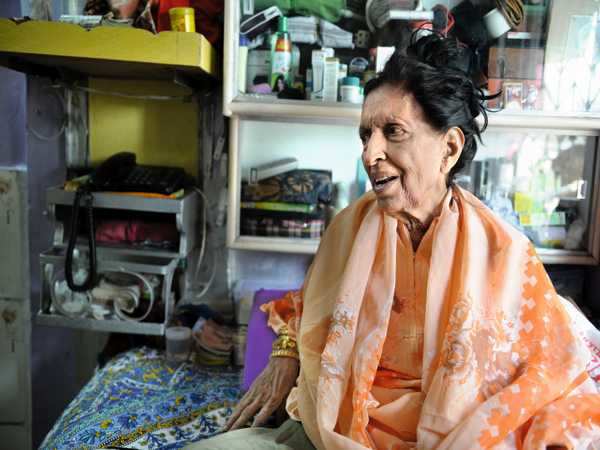
Khiza ka rang kabhi nazar se door na huwa (The shade of autumn never went out of sight)
Kati hai umar baharon ki arzoo karte karte (I have spent a lifetime waiting for spring)
Singer Mubarak Begum recites the couplet to describe the past decades spent in strife and despair. Ironically, her most popular, pathos-laden number Kabhi tanhaiyon mein yoon hamari yaad aayegi, which she sang for Kidar Sharma’s Hamari Yaad Aayegi, seems to somewhere echo her present disenchantment with the industry and fans who once patronised her. Life stopped making music for the veteran singer in the 1960s, when work suddenly stopped coming her way. She alleges career sabotage. “I stopped getting work from 1965. Some leading singers didn’t want me to succeed. My records used to be sold out even before the films released. But slowly my songs were cut out. They made sure I got no work. They threw me out,” says the singer who has sung for eminent composers including SD Burman, Naushad, Kalyanji-Anandji, Jaidev and SN Tripathi through the ’50s-’60s.
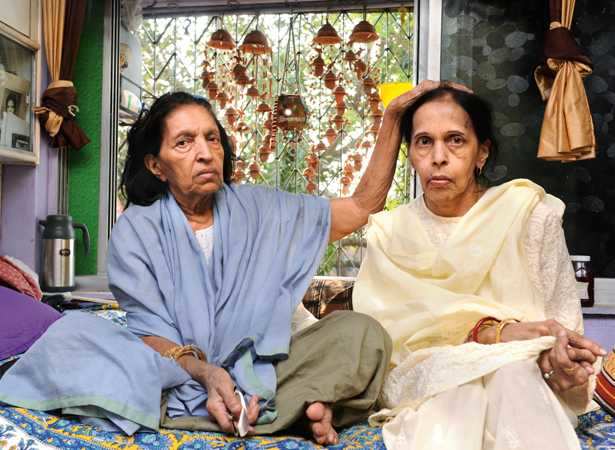
Survival woes
First pushed into poverty and later even physical incapacity (due to a back injury), she can now barely move. Her congested flat in Jogeshwari (a suburb of Mumbai) is strewn with belongings, her bed occupying most of the space. Just below her bed a mattress has been placed for her 40-plus daughter Shafaq Banu, who suffers from Parkinson’s disease. I wonder whom fate has been harsher to. The 70-plus ailing singer or the young girl reduced to an invalid and traumatised by familial strife and want. Close on the heels of the AK Hangal story, where the veteran pleaded for help from the government and the industry, comes Mubarak Begum’s plight. She hopes that after reading her story, industry persons will come forward to help her. “I’ve sung for actresses including Nargis, Nadira, Meena Kumari and Helen. I’m grateful to the industry for all they gave me. But once I was out of work, nobody cared. The Government earlier sent me Rs 1500, now it’s Rs 3000. Some fans send me money. But it’s not enough. I feel humiliated. Wherever there’s a Mohammed Rafi concert, I participate. I’m taken in an armchair. But I can’t be part of reality shows and fight like them.” She continues, “It’s difficult to pay the gas, maintenance and electricity bills. My daughter can’t eat normal meals. She has to be given fruit. We can’t afford it. At least Rs 10,000 is needed for her medical expenditure. My son runs a private taxi. He has four daughters. I don’t take help from him.”
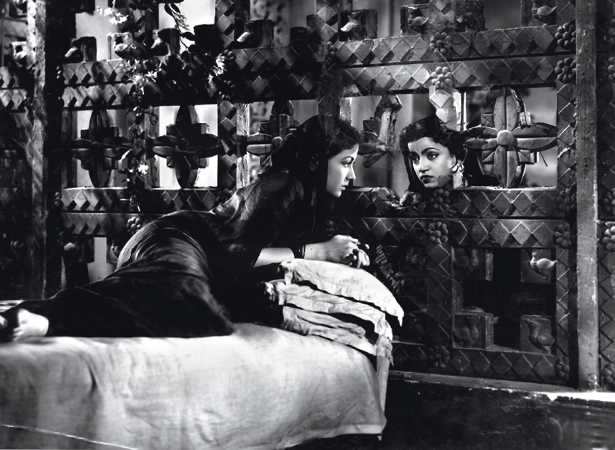
Making music
The Rajasthan-born Mubarak Begum grew up in Ahmedabad. “My Abbaji (father) and Bade Abba (uncle) were fruit sellers. I’d insist that they take me along for movies. But once the lights went off, I’d fall asleep. But I loved music. It was impossible to sing like Noor Jehanji. I was inspired by Suraiyaji and sang her numbers like Door papiha bola (Gajre) and Panchi ja (Mehtab). She sang in a seedhi seedhi (simple) style. There was no banavatipan (artifice) in her voice.”
After a while, her father tired of his meager income, decided to bring little Mubarak to Mumbai to test his luck and her talent. She began singing ghazals on AIR during the ’50s. Composers Rafique Ghaznavi Khan and later Ram Daryani offered her film songs. But being just about 11, young Mubarak was overcome by mike fright. Her break eventually came with the song Mohe aane lagi angrayi (Aaiye) for composer Shaukat Dehlvi. Later she also bagged seven songs in Kamal Amrohi’s Daera (1953). Unfortunately, the film tanked and her songs didn’t get their due. Her big moment came when she sang in Bimal Roy’s Devdas (1955). “I was first given just two lines, Woh na aayenge palatkar, unhein lakh hum bulaayein. These were to be repeated over and over again. Sahir saab (Ludhianvi, lyricist) loved the way I sang them and wrote a full song instead. Burmanda (late composer S D Burman) was pleased and praised me. All I could remember at that time was how he had earlier dismissed me saying, ‘Awaaz polish karo (polish your voice)!’.” After this came another Bimal Roy hit — the song Haal-e dil sunayege in Madhumati (1958).
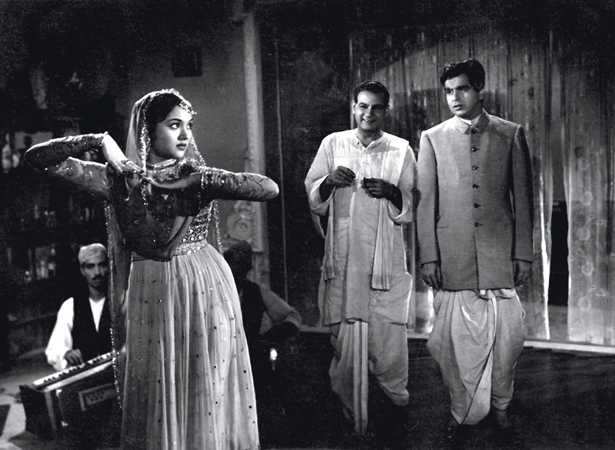
Happy tunes
She recalls some memorable moments. Like the time she sang her hit number Mujhko apne gale laga lo (Humrahi) at the Filmfare Awards in the ’60s. “I happened to get that song as a top singer didn’t turn up for the recording. It was the theme song of Humrahi. When she got to know that I had sung it she objected. But Jaikishenji said that he wouldn’t have anyone else sing it. For the Filmfare function, I went to Kashmir Emporium and got myself a beautiful saree.” She adds, “Once I performed at Rang Bhawan with Talat Mehmood and Manna Dey. People were sitting on cars outside the venue to hear me. My Woh na aayenge palatkar met with deafening applause. I still have the shawl I was honoured with.” She shared a warm relationship with her Daera heroine Meena Kumari too. “Meenaji liked the kurtas and the Rajasthani mojris I wore. So I’d get them for her. Once she got me an off-white sari with a purple border. It proved very lucky for me. Whenever I wore it, the recording went off smoothly,” she says. “But she was a sad person. She missed being a mother. She had a romantic temperament and was often betrayed. No one was with her during her last days.”
She also recalls the moment when she recorded the number Kabhi tanhayiyon mein. “At the recording, Kidar Sharma sat with his eyes closed till the song was done. He then got up and gave me four annas. When I hesitated, composer Snehal Bhatkar told me, ‘Take it. Whoever he gives money to makes a name.’ The song became famous. People would put four annas in the jukebox and hear it all day long. They’d place bets as to who had sung it, Lata Mangeshkar or me.”
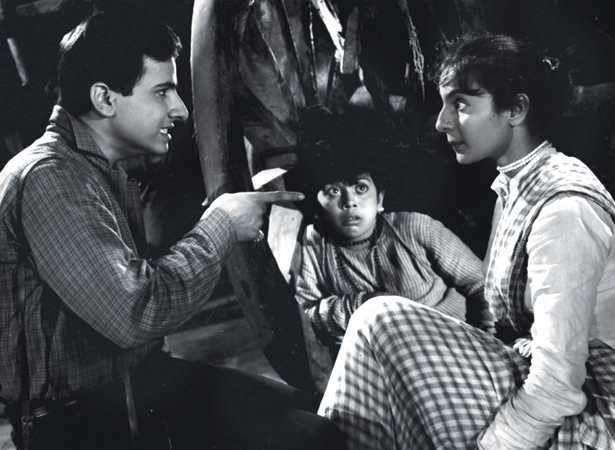
Discordant notes

Khiza ka rang kabhi nazar se door na huwa (The shade of autumn never went out of sight)
Kati hai umar baharon ki arzoo karte karte (I have spent a lifetime waiting for spring)
Singer Mubarak Begum recites the couplet to describe the past decades spent in strife and despair. Ironically, her most popular, pathos-laden number Kabhi tanhaiyon mein yoon hamari yaad aayegi, which she sang for Kidar Sharma’s Hamari Yaad Aayegi, seems to somewhere echo her present disenchantment with the industry and fans who once patronised her. Life stopped making music for the veteran singer in the 1960s, when work suddenly stopped coming her way. She alleges career sabotage. “I stopped getting work from 1965. Some leading singers didn’t want me to succeed. My records used to be sold out even before the films released. But slowly my songs were cut out. They made sure I got no work. They threw me out,” says the singer who has sung for eminent composers including SD Burman, Naushad, Kalyanji-Anandji, Jaidev and SN Tripathi through the ’50s-’60s.

Survival woes
First pushed into poverty and later even physical incapacity (due to a back injury), she can now barely move. Her congested flat in Jogeshwari (a suburb of Mumbai) is strewn with belongings, her bed occupying most of the space. Just below her bed a mattress has been placed for her 40-plus daughter Shafaq Banu, who suffers from Parkinson’s disease. I wonder whom fate has been harsher to. The 70-plus ailing singer or the young girl reduced to an invalid and traumatised by familial strife and want. Close on the heels of the AK Hangal story, where the veteran pleaded for help from the government and the industry, comes Mubarak Begum’s plight. She hopes that after reading her story, industry persons will come forward to help her. “I’ve sung for actresses including Nargis, Nadira, Meena Kumari and Helen. I’m grateful to the industry for all they gave me. But once I was out of work, nobody cared. The Government earlier sent me Rs 1500, now it’s Rs 3000. Some fans send me money. But it’s not enough. I feel humiliated. Wherever there’s a Mohammed Rafi concert, I participate. I’m taken in an armchair. But I can’t be part of reality shows and fight like them.” She continues, “It’s difficult to pay the gas, maintenance and electricity bills. My daughter can’t eat normal meals. She has to be given fruit. We can’t afford it. At least Rs 10,000 is needed for her medical expenditure. My son runs a private taxi. He has four daughters. I don’t take help from him.”

Making music
The Rajasthan-born Mubarak Begum grew up in Ahmedabad. “My Abbaji (father) and Bade Abba (uncle) were fruit sellers. I’d insist that they take me along for movies. But once the lights went off, I’d fall asleep. But I loved music. It was impossible to sing like Noor Jehanji. I was inspired by Suraiyaji and sang her numbers like Door papiha bola (Gajre) and Panchi ja (Mehtab). She sang in a seedhi seedhi (simple) style. There was no banavatipan (artifice) in her voice.”
After a while, her father tired of his meager income, decided to bring little Mubarak to Mumbai to test his luck and her talent. She began singing ghazals on AIR during the ’50s. Composers Rafique Ghaznavi Khan and later Ram Daryani offered her film songs. But being just about 11, young Mubarak was overcome by mike fright. Her break eventually came with the song Mohe aane lagi angrayi (Aaiye) for composer Shaukat Dehlvi. Later she also bagged seven songs in Kamal Amrohi’s Daera (1953). Unfortunately, the film tanked and her songs didn’t get their due. Her big moment came when she sang in Bimal Roy’s Devdas (1955). “I was first given just two lines, Woh na aayenge palatkar, unhein lakh hum bulaayein. These were to be repeated over and over again. Sahir saab (Ludhianvi, lyricist) loved the way I sang them and wrote a full song instead. Burmanda (late composer S D Burman) was pleased and praised me. All I could remember at that time was how he had earlier dismissed me saying, ‘Awaaz polish karo (polish your voice)!’.” After this came another Bimal Roy hit — the song Haal-e dil sunayege in Madhumati (1958).

Happy tunes
She recalls some memorable moments. Like the time she sang her hit number Mujhko apne gale laga lo (Humrahi) at the Filmfare Awards in the ’60s. “I happened to get that song as a top singer didn’t turn up for the recording. It was the theme song of Humrahi. When she got to know that I had sung it she objected. But Jaikishenji said that he wouldn’t have anyone else sing it. For the Filmfare function, I went to Kashmir Emporium and got myself a beautiful saree.” She adds, “Once I performed at Rang Bhawan with Talat Mehmood and Manna Dey. People were sitting on cars outside the venue to hear me. My Woh na aayenge palatkar met with deafening applause. I still have the shawl I was honoured with.” She shared a warm relationship with her Daera heroine Meena Kumari too. “Meenaji liked the kurtas and the Rajasthani mojris I wore. So I’d get them for her. Once she got me an off-white sari with a purple border. It proved very lucky for me. Whenever I wore it, the recording went off smoothly,” she says. “But she was a sad person. She missed being a mother. She had a romantic temperament and was often betrayed. No one was with her during her last days.”
She also recalls the moment when she recorded the number Kabhi tanhayiyon mein. “At the recording, Kidar Sharma sat with his eyes closed till the song was done. He then got up and gave me four annas. When I hesitated, composer Snehal Bhatkar told me, ‘Take it. Whoever he gives money to makes a name.’ The song became famous. People would put four annas in the jukebox and hear it all day long. They’d place bets as to who had sung it, Lata Mangeshkar or me.”

Discordant notes
But there’s lots that has left her embittered. While she maintains that the late singer Geeta Dutt “never made fun of any singer”, others did. “They’d laugh and distract me, so that
I wouldn’t get it right and was made to leave. On another occasion, I got a phone call. I didn’t recognise the voice and asked who it was. She replied, “Hum woh hai jo jab chahe tumhe industry se nikal sakte hain (I’m the one who can get you thrown out of the industry). She then started laughing and revealed her identity. She had conveyed what she wanted to. Once during Ramzan (a month when Muslims do charity) I received an envelope containing Rs 500. The address was that of a leading singer. I was taken aback at the meager amount but I kept it as a shagun (auspicious token). I called her up to say so. But her sister picked up the phone. I couldn’t help saying, ‘If you wished to help, you could’ve sent something more’. She replied, ‘Hamara bhi pura nahin padta (we find it difficult to meet our expenses)’.”
She continues her angst, “The world knows who didn’t let me succeed. I took to singing to look after my family. I didn’t come here for name or fame. My songs were dropped from films or sung again by someone else. They did this with many artistes. They said, ‘If you make so and so sing, we’ll never sing for you’. The composers would get scared. They had no faith in themselves.” Ultimately a depression-ridden Mubarak Begum says she began resorting to sleeping tablets. “I was taken to a psychiatrist as I had become numb and withdrawn. Meri rozi par asar padha tha (My bread and butter was snatched away).”
She recalls the humiliation she went through for survival. “I went to Rajendra Mehta’s (ghazal singer) house asking to be part of his shows. But he said he had no work for me. I even approached Nitin Mukesh and Tariq Hussain to let me be part of their shows but they also declined. Music companies like HMV give me no royalty. The leading singers were smart and had managed to get it granted for themselves.” One person she’s all praise for is Hridaynath Mangeshkar. “I like his Marathi compositions. Once I was asked to perform with him. When I went there, he quietly put an envelope of money in my purse without my asking for it. He’s that well-mannered.” She also speaks highly of Javed Akhtar through whose efforts she could procure this flat granted by the Chief Minister’s quota for artistes. And it’s instances like these that reinforce her belief in goodness and a better tomorrow. “You complain to those you love, don’t you?”
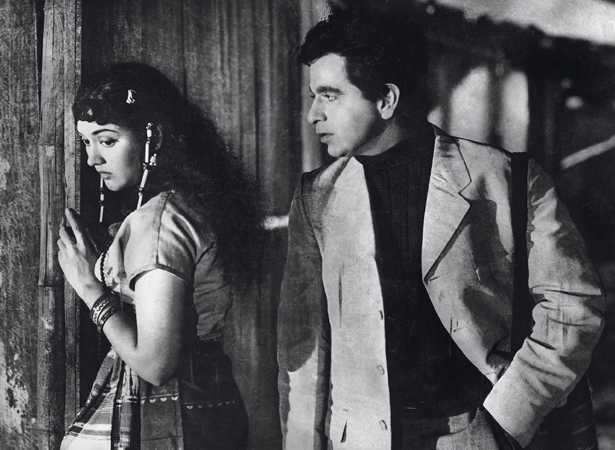
Mubarak Begum’s popular songs
Kabhi tanhaiyon mein
Hamari Yaad Aayegi
Mujhko apne gale lagaa lo Humrahi
Bemurrawwat bewafa begana dil
Susheela
Haal-e dil sunayege
Madhumati
Woh na aayenge palatkar
Devdas
More on: Mubarak Begum
xxxxxxxxxxxxxxxxxxxxxxxxxxx
XXXXXXXXXXXXXXXX
From Wikipedia, the free encyclopedia

This article relies largely or entirely on a single source. Relevant discussion may be found on the talk page. Please help improve this article by introducing citations to additional sources.
Find sources: "List of songs recorded by Mubarak Begum" – news · newspapers · books · scholar ·JSTOR (August 2019)
Mubarak Begum is a ghazal singer in Bollywood in the 1950s and 1960s. In her lifetime, she has sung 174 film songs (2 in Bhojpuri) and 13 non-film songs.
Songs[edit]
- "Mohe aane lagi angdai aaja aaja" (aaiye, 1949)
- "Aao chale sakhi wahan" with Lata Mangeshkar (aaiye, 1949)
- "Dekho ji baat suno" (Basera, 1950)
- "Janam janam hum sang rahenge" (Basera, 1950)
- "Prem kahani chhed jawani"
- "Shaam hui aur deep jale" with Sulochna Kadam (Basera, 1950)
- "Maathe pe bindiya kanon men jhumke" (Dolti Naiya, 1950)
- "Shaam hui aur deep jale" (Dolti Naiya, 1950)
- "Janam janam ham sang rahenge" (Dolti Naiya, 1950)
- "Prem kahani chhed jawani" (Dolti Naiya, 1950)
- "Bach bach ke jawani pagh dhare" (Phoolon Ka Haar, 1951)
- "Ek do teen chaar paanch che" (Phoolon Ka Haar, 1951)
- "O zalim bedardi dil men dard tumhare hai" (Phoolon Ka Haar, 1951)
- "Lapak jhapak aay meethi meethi nindiyan" (Phoolon Ka Haar, 1951)
- "Jinke preetam sang hai unki diwali hai" (Phoolon Ka Haar, 1951)
- "Jhoom jhoom kar door gagan with Devendra" (Phoolon ka Haar, 1951)
- "Mohabbat hote hote ho gayi "with Devendra (Phoolon ka Haar, 1951)
- "Naam tere bhool jaoon" (Mamta, 1952)
- "Lekh vidhaata ka likhna" (Mordhawj, 1952)
- "Gupchup un sang ho gayi ankhian" (Mordhawj, 1952)
- "Jal jal ke maroon kuch keh na sakoon" (Sheeshaa, 1952)
- "Tera mera jod nehin hain" (Char Chand, 1953)
- "Paale soz e gham" (Daaera, 1953)
- "Deep sang jaloon aaj main" (Daaera, 1953)
- "Jail jo shama zamane ko ho gaya maloom" (Daaera, 1953)
- Suno more naina" (Daaera, 1953)
- Devta tum ho mera" with Mohd Rafi (Daaera, 1953)
- "Raat kaise kati bata na sake" (Dharma Patni, 1953)
- "Dil ki duniya pe chha gaya koi" (Africa, 1954)
- "Lakh lakh taren liye" (Aamir, 1954)
- "Aaj ghar wale ghar nehin" with Shamshad Begum (Aulaad, 1954)
- "Aye khuda mazdoor ki fariyaad" (Chandni Chowk, 1954)
- "Ghir ghir aaye badarva kare" (Dak Babu, 1954)
- "Nehin achha pyar bhare dil ko satana" (Gawaiya, 1954)
- "Kaliyon ko choomu main" (Gul Bahar, 1954)
- "Is haath de us haath le" (Gul Bahar, 1954)
- "Ho gaya ho gaya unse pyar thoda sa" (Har Jeet, 1954)
- "Zamane ka gila" with S Balbir (Har Jeet, 1954)
- "Kya bataen tere dildaar pe" (Maan, 1954)
- "Kya khabar thi yun tamanna" (Rishta, 1954)
- "Ek hi rishta maa ka" (Rishta, 1954)
- "Tera bachpan ek kahani bhool na jana" (Sangam, 1954)
- "Na manzil hai na" with Asha Bhosle & Talat Mehmood (Tatar ke Chor, 1954)
- "Dil hamse woh lagaye" with Lata Mangeshkar (Baradari, 1956)
- "Wo na aayenge palat ke" (Devdas, 1955)
- "Main hoon nisaar tujhpe dil hai nisaar" (Jasoos, 1955)
- "Dil toot gaya ulfat ki kasam" (Jasoos, 1955)
- "Baba ban gaya gentlemen" (Khandan, 1955)
- "Mera bhola balam dil ki batiyaan" (Kundan, 1955)
- "Jevan ka too ujiyara hai with Sudha Malhotra (Patit Pawan, 1955)
- "Dil ko laga ke huzoor tum to" (Rukhsana, 1955)
- Bhari mehfil men (Rukhsana, 1955)
- "Kurban ho gaye tujhpe" with Shamshad Begum (Sau Ka Note, 1955)
- "Sajan ke nainon se" (Sakhi Lutera, 1955)
- "Aji is fani dunia men mohabbat ke" (Aan Baan, 1956)
- "Ae ji dekho dekho ji dekho" (Awara Shahzadi, 1956)
- Dilwalo pyar karlo humse" (Awara Shahzadi, 1956)
- "Is duniya ka khel" (Badal Aur Bijli, 1956)
- "Raat kitni haseen hai" with Talat Mehmood (Badal Aur Bijli, 1956)
- "Kaisa zamana aaya" with Madhubala Jhaveri (Badal Aur Bijli, 1956)
- "Chand muskuraye sanam" (Baghdad Ka Jadoo, 1956)
- "Kurban sanam" (Baghdad Ka Jadoo, 1956)
- "Yeh zindagi ka caravan" with Mohd Rafi (Baghdad Ka Jadoo, 1956)
- "Yeh mausam suhana rut hai suhana" (Baghi Sardar, 1956)
- "Ae jaan e wafa nazrein to mila" (Baghi Sardar, 1956)
- "Leherdaar bichhuade" (Dhola Maru, 1956)
- "Sawan aaye re" with Lata Mangeshkar (Dhola Maru, 1956)
- "Aye sakhi chhed zara" (Fighting Queen, 1956)
- "Nazrein uthao pyar ki" (Fighting Queen, 1956)
- "Jhanan jhanan payal baaje" with? (Fighting Queen, 1956)
- "Dekho dekho nihaar ritu aaye" (Harihar Bhakti, 1956)
- "Meri nazaron ki theeki maar" (Harihar Bhakti, 1956)
- "Chanda ka rang liye taron ke sang" (Harihar Bhakti, 1956)
- "Chori chori aayi gori with Sulochna Kadam" (Harihar Bhakti, 1956)
- "Dil bechara pyar ke maara" (Jungle Queen, 1956)
- "Chatki hai chandni" (Jungle Queen, 1956)
- "Dilwalo lo aaye din" (Jungle Queen, 1956)
- "Dil leke nighahon ka churana" (Lal-E-Yaman, 1956)
- "Ghoonghat hate ke nazren mile" (Rangeen Raatein, 1956)
- "Maharaja khivariya khol" (Sultana Daku, 1956)
- "Tirchhi nazar se hamen na dekho" (Sultana Daku, 1956)
- "Biduwaash daao more hote" (Fashion, 1957)
- "Bharat ke log geet" with Sulochna Kadam (Fashion, 1957)
- "Jalwa jo tera dekha hamne" (Gateway of India, 1957)
- "Dunia ke diwane kya peer parai jane" (Maharani, 1957)
- "Jumna nahaao ri sapne men sajan" (Maharani, 1957)
- "Kamsini mein karti thi lakhon duaen" (Maharani, 1957)
- "Kya kya khel dikhaye qayamat dhaye" (Patal Pari, 1957)
- "Khatma bil kar apna ho chukka" (Paisa, 1957)
- "Ahmed paak jinka naam" (Parvin, 1957)
- "Mashoor hai rawaayat rehte the peer" (Parvin, 1957)
- "Ya khuda karim" (Parvin, 1957)
- "Haay saiyan ne baiyan marod dali" (Chetak Rana Pratap, 1958)
- "Adaayen teer hain andaz nirale hain" (Jungle Princess, 1958)
- "Ham haal e dil sunayenghe" (Madhumati, 1958)
- "Musafir hai hum tum yeh dunia sare" (Sim Sim Marjina, 1958)
- "Tere sitam ki dastan" (Behram Daku, 1959)
- "Nazren meri bharpur" with S Balbir (Chini Jadugar, 1959)
- "Teri chaal pe sanam main" withS Balbir (Chini Jadugar, 1959)
- "Chala chal musafir" (Maa Ka Ansoo, 1959)
- "Kaisi been bajai" (Jalim Jadugar, 1960)
- "Karoon salaam jhuk" with? (Jalim Jadugar, 1960)
- "Husn ki baraat" with Lata Mangehskar & Shamshad Begum (Mughal e Azam, 1960)
- "Mohabbat kisko kehte hain" (Return of Mr Superman, 1960)
- "Piye ja piya ja piye ja" (Veer Durghadas, 1960)
- "Shama gul karke na jao yun" (Arab Ka Sitara, 1961)
- "Salam tujhpe" with Minoo Purshottam (Arab Ka Sitara, 1961)
- "yeh ye yaah rakhna sanam" (Daku Mansoor, 1961)
- "Raja se bikhari tak" with S Balbir (Dekhi Teri Bombay, 1961)
- "Jhumo mastiyaon men gawo" (Gypsy Girl, 1961)
- "Kabhi tanhaiyion men yun hamari yaad" (Hamari Yaad Aayegi, 1961)
- "Gham chhodo yeh zare zamane ka" (Piya Milan Ki Aas, 1961)
- "Aisa chalu jadu dil par rahe na kabu" (Shahi Farman, 1961)
- "Kaliyon ne suna" with Seeta Agarwal (Shahi Farman, 1961)
- "Phool bagiya men bhanvre aaye" (Zindagi Aur Khwab, 1961)
- "Nighahon se dil ka salaam aa raha hai" (Cobra Girl, 1963)
- "Mujhko apne gale lagalo" with Mohd Rafi (Humrahi, 1963)
- "Wafaon ka alam mitne laga" (Sunehri Nagin, 1963)
- "Main to ho gai re badnaam" (Sunehri Nagin, 1963)
- "Hamen dam daike" with Asha Bhosle (Yeh Dil Kisko Doon, 1963)
- "Chand gagan men ek hai chamka" (Aandhi aur Toofan, 1964)
- "Payaliya chhankat" (Balma Bada Nadan, 1964) [Bhojpuri]
- "Bharat ke naujawanon bharat ke kaam aao" (Fariyaad, 1964)
- "Delhi se do bahane aai" (Fariyad, 1964)
- "Tune teri nazar ne to kafir bana diya" (Fariyad, 1964)
- "Nighahon se dil men chale aaiyega" (Hameer Hath, 1964)
- "Aail barkha bahar" (Kab Hum Ho Hain Gawana Hamaar, 1964)
- Sautan jin laiha (Kub hum Ho Hain Gawana Hamaar, 1964)
- Husnwalon se na milna ye daga dete hai" (Magic Carpet, 1964)
- "Ankhon ankhon har ek raat guzar jati hai" (Marvel Man, 1964)
- "Chadela asaadha bharela sab nindiya" (Nihar Chutal Jai, 1964) [Bhojpuri]
- "Dil ki na jane anari balma" (Pahadi Nagin, 1964)
- "Gore gore mukhde pe teel kala" with Ambar Kumar (Pahadi Nagin, 1964)
- "Chah karni thi chah kar bhaite" with Asha Bhosle (Punar Milan, 1964)
- "Kuchh ajnabi si aap hain" (Shagun, 1964)
- "Itni bi kareeb aake bhi kya" with Talat Mehmood (Shagun, 1964)
- "Aise hum barbaad hue koi sahara na" (Tarzan and Captain Kishore, 1964)
- "Pyar ki raat aur yeh tanhai" (Tarzan and Captain Kishore, 1964)
- "Aye jane nazar chilman se agar" (Qawwali Ki Raat, 1964)
- "Dekh kar meri taraf khamosh ho jana" (Qawwali Ki Raat, 1964)
- "Jab ishq kahin ho jata" with Asha Bhosle (Qawwali Ki Raat, 1964)
- "Nazar aate ho tum" (Black Arrow, 1965)
- "Ae dil bata hum kahan aa gaye" (Khooni Khazana, 1965)
- "Abhi abhi nazar mili" (Main Hoon Jadugar, 1965)
- "Dekha jo hamne aap ko armaan machal gaye" (Main Hoon Jadugar, 1965)
- "Mehfil men aap" with Suman Kalyanpur & Jagjit Kaur (Mohabbat Isko Kehte Hain, 1965)
- "Mere aansuon pe na muskura" (More Man Mitwa, 1965)
- "Haseenon ke dhoke men aana na aye dil" (Tarzan and King Kong, 1965)
- "Pyar kare pyar kare jise chahe" (Gagola, 1966)
- "Zara kehdo fizaon se hamen" (Gagola, 1966)
- "Saqiya ek jaam" with Asha Bhosle (Neend Humare Khwab Tumhare, 1966)
- "Khub ba khud ishq ka izhaar hua jaata hai" (Professor Aur Jadugar, 1966)
- "Bemuravat bewafa begane dil aap hai" (Sushila, 1966)
- "Main sunati hoon ek majra" with Shankar Shambhu (Teesri Kasam, 1966)
- Ae dil tere muqaddar ka aaj faisla hoga (Zimbo fins a son, 1966)
- "Hum to dil bechte hain" (Mera Bhai Mera Dushman, 1967)
- Humne tumhen sikhlaye with Amar & Bhooshan (Mera Bhai Mera Dushman, 1967)
- "Manwa nehin meet" (Awara Ladki, 1967)
- "Yeh moonh aur masoor ki daal" with Sharda (Around The World, 1967)
- "Kaise zulmi se naina hamara laga" (Poonam Ki Chand, 1967)
- Neend ud jaye" with Suman Kalyanpur & Krishna Bose (Juari, 1968)
- "Wada hamse kiya dil kisi ko diya" (Saraswatichandra, 1968)
- "Matwaare sanwariya ke naina" (Hum Ek Hain, 1969)
- "Suno haal meri zindagi ka" (Chandan, 1971)
- "Huns ko kar be naqab kar raha sab ko salaam" (Chandan, 1971)
- "Balma tu har wade par karta hai" (Chattan Singh, 1974)
- "Dard e dil dard e wafa dard e tamanna kya hai" (Subah Zaroor Aayegi, 1977)
- "Aao tumhe pyar karoon" (Ramu Toh Deewana Hain, 1980)
- "Sanwariya teri yaad men ro ro marenge hum" (Ramu Toh Deewana Hain, 1980)
- "Zindagi ham tere had se guzar gaye" (Sister, 1980)
- "Hamen mitane aaya jo" - with Shamshad Begum (Ganga Mang Rahi Balidan, 1981)
- Karlo jitna sitam kar - with Shamshad Begum (Ganga Mang Rahi Balidan, 1981)
- "Ho sanam tere liye" with Shamshad Begum (Ganga Mang Rahi Balidan, 1981)
- "Pahenke main nau gai ki men sadi" (Nai Imarat, 1981) [1]



